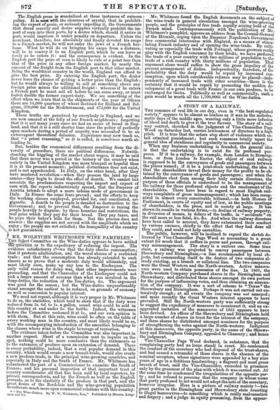MR. WOLRYCHE WHITMORE'S WINE PAMPHLET.* Tax Se._ect Committee on the
Wine-duties appears to have settled Westifin as to the expediency of reducing the impost. The evidence satisfactorily shows that the duty checks consumption; that it protects adulteration, and the worst abuses of a restricte trade ; and that the consumption has already extended to such classes as to prove that a moderate duty would ultimately, and most likely soon, make up any loss to the Exchequer. The only valid reason for delay *as, that other improvements were proceeding, and that the Chancellor of the Exchequer could not risk a larger amount of revenue than what was involved in the Soap-duties, the reduction of the Tea-duties, &c. The argument was good for the season ; but the Wine-duties unquestionably stand amongst the earliest to be reduced, on grounds of economy as well as concession to popular interest.
We need not repeat, although it is very proper in Mr. Whitmore to do so, the statistics which tend to show that if the duty were reduced from 58. 6d. to is. a gallon, sound wine could be sold in this country at and under 28. the bottle. Indeed, the witnesses before the Committee reckoned it at is., and our own opinion is with them. But at this rate, wine could be often on the table of every working man in the country, and most likely would be so, with the accompanying introduction of the amenities belonging to the classes where wine is the staple beverage of recreation.
The evidence taken before the Committee was also important in another respect. Short of a commission sent to inquire on the spot, nothing could be more conclusive than the statements as to the extension of produce upon an extension of demand. There is every probability, indeed, that a real popular demand in this country, which would create a new transit-trade, would also create a new produce-trade, in the principal wine-growing countries, and especially in Italy and the South of France. Mr. Whitmore has volunteered the part of a Commissioner to examine the South of France - and his personal inspection of that important tract of country corroborates all that has been said by local reporters, by private correspondents, and by the French as well as the English journals, as to the elasticity of the produce in that part, andT the great desire of the Bordelais and the wine-growing population to cultivate much more open commercial relations with this country. • " The Wine-Duties. By W. W. Whitmore, Esq." Published by Messrs. Long- man and Co.
Mr. Whitmore found the English documents on the subject of the wine-trade in general circulation amongst the wine-growing people, and the principles of free trade rapidly seizing hold of the French mind. Contemporaneously with the publication of Mr. Whitaiore's pamphlet, appears an address from the Council-General of the Herault, urging upon the Emperor Napoleon's Government free commercial intercourse with England, as a means of stimu- lating French industry and of opening the wine-trade. By culti- vating so especially the trade with Portugal, whose growers really play with the English consumer by their tricks, we have preferred the trade of a poor country with two millions of population to the trade of a rich country with thirty millions of population. That argument alone would suffice to show the gross =policy of the present arrangement of duties. Independently, therefore, of the probability that the duty would be repaid by increased con- sumption, upon which considerable reliance may be placed—inde- pendently of increased trade with other countries—there is the certainty that it would be repaid by promoting the sudden de- velopment of a great trade with France in our own produce, to be exchanged for theirs. Politically as well as commercially, such a gain would be worth all the 1,700,0001. of the Wine-duties. .


























 Previous page
Previous page